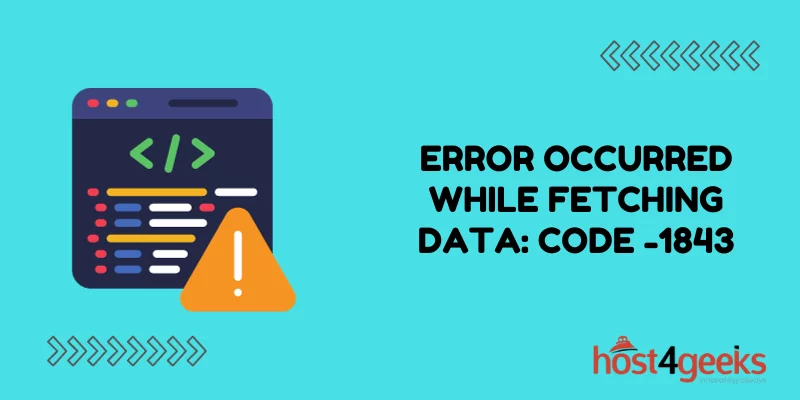Errors in coding can be both frustrating and time-consuming. Among the many cryptic error codes that can hinder progress, Code -1843 is particularly troublesome for developers working with languages like C++, Java, and Python. This comprehensive guide will provide an in-depth look at Code -1843 – what causes it, strategies to fix it, and best practices to avoid it altogether.
What is Code -1843 and Why Does it Occur?
Code -1843 is an error message encountered by programmers across various coding languages. It typically appears during compilation or execution and signals an issue with the logic flow of the code.
At its core, Code -1843 indicates a disconnection between what the code is expecting versus what it is actually receiving. This disconnect manifests in syntax errors, data type mismatches, memory problems, and other inconsistencies that disrupt the code flow.
Pinpointing the exact trigger can be challenging since the error message itself provides little detail. However, arming yourself with an understanding of the common causes is the first step toward diagnosing and fixing Code -1843.
Common Causes and Triggers of Code -1843
There are several frequent triggers that can lead to the dreaded Code -1843 appearing. Here are some of the most common culprits:
Syntax Errors
Syntax errors like missing semicolons, improper parentheses nesting, or incorrect operators are prime suspects for Code -1843. Even small syntax mistakes can derail code execution by causing misinterpretation of the instructions. Strict adherence to language syntax rules is vital to avoid these errors.
Uninitialized Variables
Trying to use a variable before it has been initialized with a value is guaranteed to cause problems. Uninitialized variables hold random garbage values that will be incorrectly interpreted during execution. Define and assign proper values to all variables before attempting to access them in code.
Memory Management Issues
Memory leaks and buffer overflows are common sources of Code -1843. Failure to properly allocate and free memory can lead to corruption and undefined behavior. Manage pointers carefully, avoid buffer overruns, and fix any leaks through debugging.
Data Type Mismatch
One of the most common triggers is using incompatible data types. Passing a string into an integer parameter or assigning a Boolean to a numeric variable will wreak havoc during execution. Ensure parameters, assignments, and operations involve matching data types.
Logical Errors
Problems with the underlying program logic can also lead to Code -1843 arising down the line. Loop conditions that never terminate, off-by-one errors, infinite recursions, and race conditions are examples of logic errors that may rear their head as Code -1843.
Meticulous debugging is needed to isolate the source of the logical flaw. Tracing the code step-by-step usually reveals the discrepancy in expected versus actual control flow.
How to Diagnose and Fix Code -1843 Errors
Once Code -1843 appears, systematic debugging is key to hunting down the specific cause. Here are proven techniques to diagnose and fix Code -1843:
Carefully Review Code Line-by-Line
Methodically go through the code line-by-line, dissecting the logic flow and looking for any syntax discrepancies. Reviewing with fresh eyes often surfaces overlooked mistakes that could be triggering the error.
Leverage Debugging Tools
Integrated development environments (IDEs) and debuggers like gdb are invaluable tools for identifying issues efficiently. Features like breakpoints and step execution can zero-in on the control flow divergence.
Verify Proper Memory Handling
Double-check that memory is allocated and freed properly throughout the code to catch any leaks or buffer issues. Tools like Valgrind for C++ can also help uncover memory problems.
Check Data Types Match
Data type mismatches are easy to introduce unintentionally. Verify variables, parameters, buffers, etc. have compatible types wherever used. Static analysis tools can automatically flag type errors.
Peer Review
Leverage a second set of eyes to provide a new perspective. Peers may quickly spot problems leading to Code -1843 that eluded the original coder, especially logic flaws.
Methodically employing these debugging strategies almost always reveals the source of the Code -1843 error.
Best Practices for Preventing Code -1843 Errors
While important to know how to fix Code -1843 when it arises, prevention is the best medicine. Applying these coding best practices can avoid Code -1843 occurring in the first place:
Follow Established Coding Standards
Adhere to language-specific coding standards and conventions. This promotes consistency across codebases and helps reduce errors that could lead to Code -1843.
Perform Rigorous Testing
Implement unit tests, integration tests, and edge case testing to catch issues pre-production. Test-driven development requires writing tests even before code is written.
Modularize Code into Reusable Functions
Break code into smaller, modular functions that encapsulate logic with clear purposes. This makes debugging simpler when problems occur.
Stay up-to-date on Language Standards/Versions
Outdated language use can introduce problems leading to Code -1843. Regularly update code to leverage the latest standards and versions for access to better tools.
Review Compiler Warnings
Don’t ignore warnings – resolve them. Modern compilers can detect many problems that would result in Code -1843 further down the line.
Conclusion
In the world of coding, errors like Code -1843 are inevitable. However, armed with a comprehensive understanding of this error and the strategies to fix and prevent it, you can navigate your way through coding challenges more effectively. Remember that coding is as much about problem-solving as it is about writing lines of code.
If you’ve encountered Code -1843, don’t be disheartened. Instead, approach it with confidence, knowing that you now have the knowledge and tools to overcome it. Happy coding!
